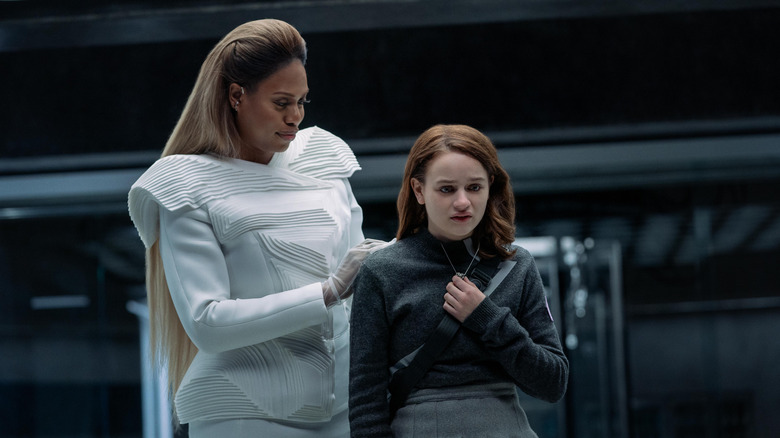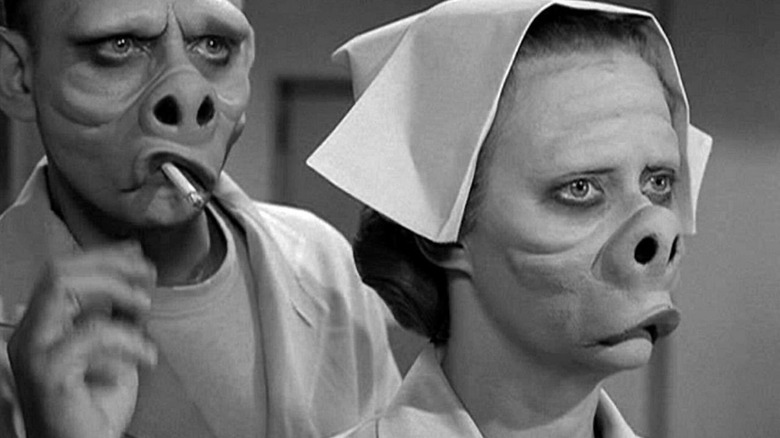“Uglies,” Netflix’s latest big movie adaptation of a young adult novel, takes place in a dystopian society in which teens are expected to go through an extreme cosmetic surgery at 16 to make them “pretty.” (Spoiler alert: This system turns out to be bad.) The film originally caught some flak online for its choice to cast conventionally attractive actors for the main “Ugly” roles, but director Joseph McGinty Nichol (widely known as McG) has clarified that there’s a pretty good reason for this. As he explained in an interview with The Wrap:
“We’re saying it’s never enough […] I think, if you spoke to some of the most universally regarded beautiful people in the world, they’re some of the people with the most intense body dysmorphia. Nobody’s immune from this toxicity that’s out there of ‘It’s never enough. You can always have a thinner waist, bigger hips, fuller lips.’ Take your pick. You see it out there every day, and this movie is meant to be the antidote to that way of thinking.”
Sure enough, “Uglies” is not necessarily a story about the value of beauty, but also about the idea that beauty is not an objective thing. Mandatory cosmetic procedures aren’t just bad because physical beauty should not be given so much importance in society, but also because beauty standards are constantly evolving in ways that are impossible to pin down. Or, as “The Twilight Zone” creator Rod Serling might put it, beauty is in the eye of the beholder. That’s why it’s no surprise that “The Twilight Zone” was a major inspiration for “Uglies” author Scott Westerfeld.
Uglies actually draws from multiple Twilight Zone episodes
The obvious assumption is that “Uglies” was inspired by “The Eye of the Beholder,” the classic 1960 episode about a woman who’s deemed hideous by the society she lives in, only to be revealed as a total smokeshow by our standards. It turns out that “beautiful” in this society means having pig-like facial features, which the doctors and nurses all share. Everyone remembers the big reveal scene, but less talked about is the episode’s quasi-happy ending, where the heroine gets the chance to enjoy life in a separate community with all the other “hideous” rejects. Sure, nobody in this episode learns any lessons about the subjectivity of beauty, but at least in the end the main character isn’t forced to sacrifice her humanity in order to fit in.
“Uglies” explicitly pays tribute to this episode in a sequence where its main character, Tally (Joey King), sneaks into the Pretty Town by disguising herself with a pig mask — one that’s awfully reminiscent of the masks in “Eye of the Beholder.” It’s nice to know that, even though the episode came out 64 years ago, it’s still having such a strong influence on pop culture. A good story really can stick in public consciousness far longer than anyone at the time would’ve guessed.
But perhaps the more obvious comparison to “Uglies” is the season 5 “Twilight Zone” episode “Number 12 Looks Just Like You.” This one takes place in a society where teenagers are all forced through a process called “transformation,” which makes them beautiful at the expense of killing their individuality and their capacity for empathy. Like with “Uglies,” the main character initially resists the procedure, only to find that staying true to herself in this world is even harder than it seemed.
Westerfeld even wrote a blog post in 2008 about the episode, saying that he “hadn’t seen this gem since I was a little kid, so I’d forgotten all the details.” You might expect him to be defensive against potential copycat allegations, but Westerfeld rightly pointed out that “The Twilight Zone” was hardly the first show to cover this territory either. As he wrote in his post:
“Of course, compulsory plastic surgery is a venerable theme in sf. Not surprising, given that the first elective nose job occurred about a century ago, about the same time as H.G. Wells was writing ‘War of the Worlds.’ […] Other early fictional examples of compulsory cosmetic/brain surgery include L.P. Hartley’s 1960 story ‘Facial Justice,’ Kurt Vonnegut’s ‘Harrison Bergeron’ (1961), and of course Ira Levin’s ‘Stepford Wives’ (book: 1972; films: 1975, 2004).”
“Uglies” is now streaming on Netflix.




